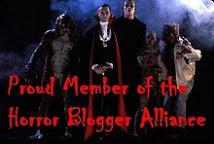Curtis' version is billed as a straight adaptation of Bram Stoker's Dracula, but the story written by the legendary Richard Matheson for this TV movie takes a few liberties with the novel - which makes it just like every other adaptation of the tale. The set up is the same - British real estate dude Jonathan Harker goes to Transylvania, meets Dracula, and leads Dracula to London where he obsesses over Jonathan's bride/fiance (depending on the version) Mina. The twist, which Curtis admits is clearly a rip off (of himself), as he borrows from the love storyline of his hit series and makes Mina the spitting image of his long lost lover. The result is another melodramatic Dracula tale, but one with a key element that keeps the film edgy.
That edge is provided by the man in the title role, respected gruff guy Jack Palance. It's an odd casting (if nothing else, Palance's head doesn't seem to be the shape of the head I expect from Dracula) and one that immediately piqued my interest in the production. This isn't like having Christopher Lee or Bela Lugosi in the role, because Palance is all about the intensity and doesn't offer much of the suave romanticism that his counterparts brought the table. I mean, when Lee snarls at the camera because his brides are being wenches it's cool and scary. When Palance does it it's like he's a cat facing off with a dog and putting on the snarl. It's animalistic and harsh and unsettling - which is cool in its own way, but not at all comforting. This is not the film where you're going to see Dracula making hungry eyes at his victim like Patrick Swayze would in the role.
Palance works in the role because the film allows him to suck all the air out of the melodrama whenever he needs to. The performance does an excellent job of keeping the film in horror territory, because we don't get the feeling that Dracula is the tortured, yet soothing, soul that he's often portrayed to be. Palance's Dracula is all about the tortured side of the character, and is presented as an uncaged beast who longs for his love but doesn't proceed with anything less than a determined rage. It is not what we are used to from Dracula, but it is unique and thought provoking.
You could argue that a romantic Dracula movie with an unromantic lead is problematic, and you'd be right to assume that the film has some issues. Curtis' film won't win many prizes for style or substance - though it does send some chills when utilizing Dracula's brides around Jonathan Harker - but there's a unique intrigue to this vision of the Dracula legend. The scowling performance by Palance and the soap opera-esque twist to the plot don't really fit together, but they each work on their own. Perhaps that's the most interesting fact about this Dracula; the fact that it's basically two different Draculas in one place.
The common thread that ties these two Draculas together is the pain that the Count is experiencing, and Curtis' film hammers that point home with no subtlety. A Dracula film that relies this much on misery really only works with the confluence of factors here. Palance looks like a truly beaten Drac throughout much of the film, and we buy into his quest for his lost love because he looks so intense about it, not because he's being the suave version of the character that we're used to seeing. It's an odd idea, and one that's not going to sell the film very well to the romantic horror crowd, but it establishes this film as its own beast. It's not the version that's going to make anyone forget about Lugosi or Lee (and it's occasionally laughable when it goes too far into melodrama) but it feels like an interesting addition to the Dracula mix.
















1 comment:
I actually think Palances portrayal of Dracula is THE greatest ever, Lugosi and Lee were both ludicrously over-rated rubbish.
Post a Comment